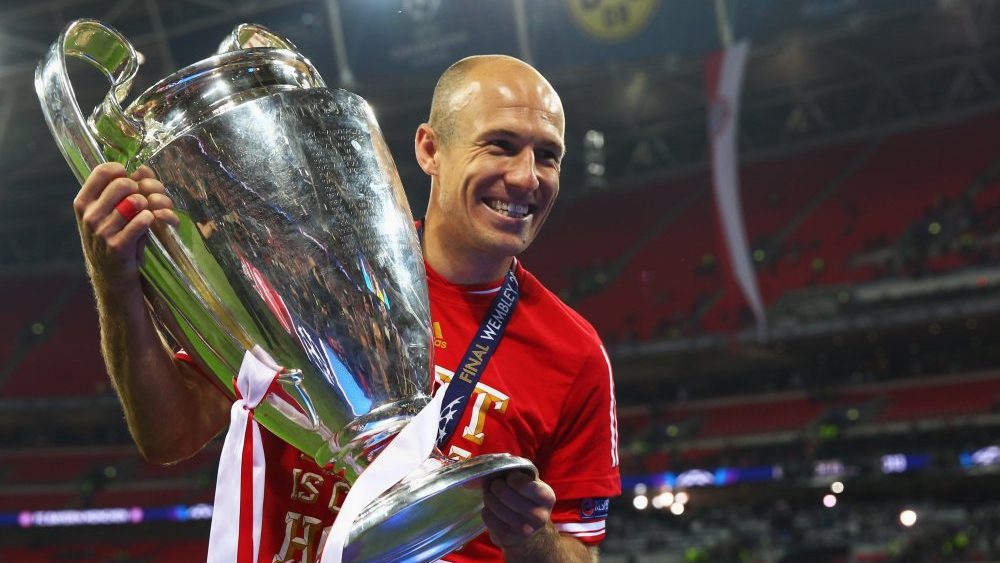Interview with Arjen Robben: “Changes of position were fun for me”
It’s been a long journey. As early as a year ago, we asked the club whether a player interview would be possible. We already weren’t ignored, but we had to stick at it. A few appointments didn’t materialise. But then it came off in this international break.
It’s not just because of his Wembley goal that Arjen Robben is a lot of Bayern fans’ absolute favourite player. His polite, friendly and pleasant manner off the pitch is what a lot are fond of. In this interview, too, the Dutchman was down-to-earth and relaxed, directly asking us to just call him Arjen.* There wasn’t a single moment in which he looked down at us.
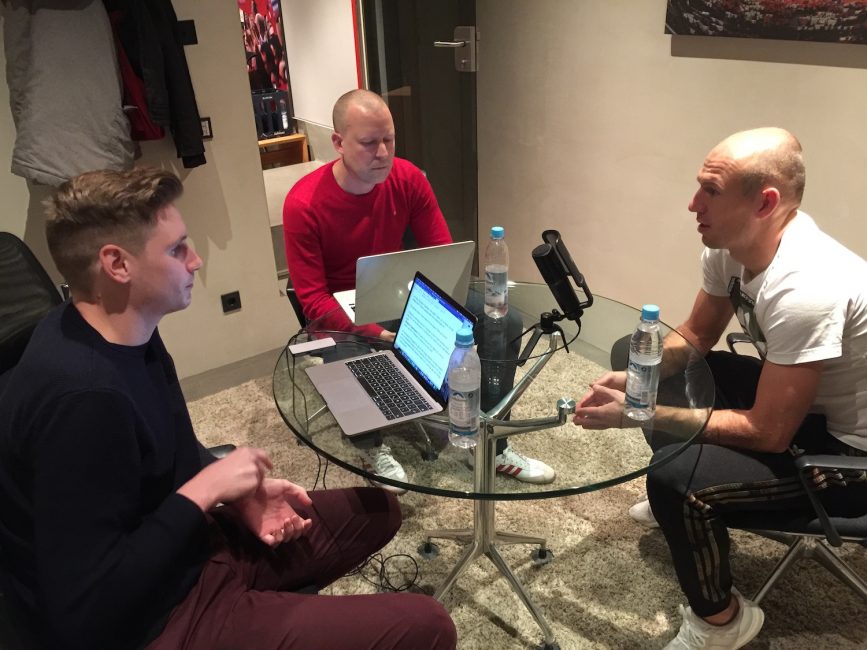
From the moment he entered the room, he exuded a calm that spread directly to us. In the conversation itself, he seemed focused and alert. Although we went a little bit over time with the actual interview, he gave us some time afterwards too. All in all, it was a very respectful and pleasant appearance from the wide forward who doesn’t want to be seen as a star at all.With Robben, we of course spoke mainly about his career and about football.
“Physically I had a bit of a problem”
Miasanrot: Hello, Arjen! Have you had an interview with a blogger before?
Arjen Robben: No, never.
Miasanrot: This is the first time that we’ve been allowed to speak to a senior player, and so we’re very happy that you’ve taken the time.
Arjen Robben: I’m excited. Let’s see how it goes (smiles).
Miasanrot: How’s your knee?
Arjen Robben: It’s good again, I’ve had a very good day – trained well on my own, put pressure on my knee too, actually got through it quite well (smiles) and yeah, that was a bit difficult just now. It’s taken a bit of time.
Miasanrot: Well it looked good for a while.
Arjen Robben: Yeah, the first three to four months there was nothing. I was involved in everything from the first to the last minute and now, above all since the last international break, I had a bit of a problem physically, here and there a little pain and then eventually an injury came. I’ve used the time to nurse those little aches and pains and to work on that a bit. When I come back, I want to come back in good shape as well. In recent weeks that’s been a bit of the problem.
Miasanrot: You often say that you work hard to prevent injuries, and that you’ve changed a lot in your career with that. But what do you mean by that exactly?
Arjen Robben: Two years ago I had a big injury to my adductors and then I really changed a lot again. In every area. Whether it’s diet, physio, training or rest, you take everything on board and you just try to do everything perfectly. Over the years you obviously learn a lot about your own body. You know what you need, what you don’t need, and then you think that you know it all and yet a few things always come along. Something small here, something there – nothing is perfect, but I try to get as close to that as possible.
Miasanrot: Are you in conversation with physios to get pointers?
Arjen Robben: Yeah, of course. For something like that you have to always be open. Here and there I get mail with advice, which I really appreciate – but you obviously can’t take suggestions from everyone. Eventually you go crazy. So you have to take a look at what suits you and be open without doing too much.
“Then they’ve just got to work their asses off”
Miasanrot: You were on ARD’s Sportschau-Club programme recently and said that you prefer to speak about football than about what happens off the pitch. So we want to speak about football with you too. You pass on the idea to young players above all that mentality is really important. Are tactical aspects equally on the agenda?
Arjen Robben: We’re always open and always ready, but obviously that also has to come from the player himself as well. If they ever want to talk, then they can always approach us more experienced players. And if they ever want to know something, we’re always there. But I think it’s a pretty big step for them when they’re allowed to train with us. Then they’ve just got to work their asses off. Then they have to show what they can do. Train with a lot of courage, be present, but also keep their eyes open and see, where can I learn, where I can develop further and now and then also learn somewhat by watching the older players.
Miasanrot: You became a pro at just 16. How was it at the time to get in amongst the seasoned players? Were you the kind of player who took the initiative to learn something?
Arjen Robben: I didn’t go up and speak to the older guys, but that was earlier… actually now I don’t want to say earlier, because then I sound like a…
Miasanrot: …grandpa…
Arjen Robben: Yeah, exactly (laughs). But it was definitely different. I also always say that you can’t forget that the whole world changes. With social media, with everything – the world develops, that’s how it is. That’s not just in football, it’s the case everywhere. And you’ve definitely got to take that on board, that children now grow up differently to us. And obviously I see that too, because I have three kids and I see it here at the club too. Only I wouldn’t swap with these kids. My youth was so great. I was always outside, had that freedom. But obviously you always have responsibility. I had to put in the performances. At 16 you break into a team that has old and experienced players and of course there were a few there who looked at me and said…
Miasanrot: …what’s he doing here…
Arjen Robben: …yeah, and I see that as a positive thing, it was a strength of mine. I followed my own path, I was self-aware. Maybe I didn’t always listen, but I did my thing and that annoyed a few people. They also spoke to me about that at times. But in spite of that I always tried to keep going and to show in every training session and in every game what I could do. And then I also got told what for from time to time. Sometimes verbally, when I was shouted at, but really shouted at. But also at times in training, where I flew through the air because someone slid into me. But you come out of that stronger.
Miasanrot: Would 16-year-old Robben have had a chance today with Bayern’s first team?
Arjen Robben: I don’t know, I would definitely be able to train with them, I think (smiles). Games would probably be something different, but at 16 I was at Groningen, and that also wasn’t the best club in Holland.
Miasanrot: That makes getting your foot in the door somewhat simpler…
Arjen Robben: …yeah, that was good. We battled against relegation. And then at 18 I made the step to PSV and there we were playing for the title, that was something different again. I think they were the right steps. But now it’s quite easy to say that of course (smiles).
“It was important that they were here”
Miasanrot: Let’s make a quick jump. In 2009 there was that situation at Real Madrid, where you were up for sale. You said that FC Bayern made the biggest effort for you. What exactly convinced you there? Did Van Gaal already have a particular idea of what he planned for you, and did he tell you about that?
Arjen Robben: Yeah, he did tell me about that. Obviously as a player that’s important. You have to know what they’re planning with you. If Van Gaal and Van Bommel hadn’t been here, I don’t know if I’d have come here. It was important that they were here. Maybe that sounds as if Bayern wouldn’t have been on my radar otherwise, but sometimes that’s how it is in football. For me the right people were here at the right moment and that’s why I made that decision. For the club it was also pretty good, I think (smiles). I’ve also said that that was the most important decision of my career.
Miasanrot: When Van Gaal and Van Bommel were then gone, did you also have thoughts about leaving?
Arjen Robben: No, absolutely not. Because then I felt so at home here. I mean, I came because the two of them were here, but then you get to know the club, the people who work here and then I felt very well.
Miasanrot: When you came to Munich, Louis van Gaal built a very strong triangle out of Philipp Lahm, Thomas Müller and yourself. How precise were the tactical demands at the time, and how much improvisation was in there?
Arjen Robben: Yeah, it was a good combination, I think. A combination of freedom, but also a certain discipline and demands. Van Gaal of course had his ideas and his game-plan and above all in defence you then have your tasks to play in the system. But I think when you have the ball yourself and you attack, then in a triangle like that the most important thing is that all the positions are occupied. It doesn’t have to be the case that I’m advanced and Thomas is then in the middle. That can change too and then the opponent can be taken by surprise
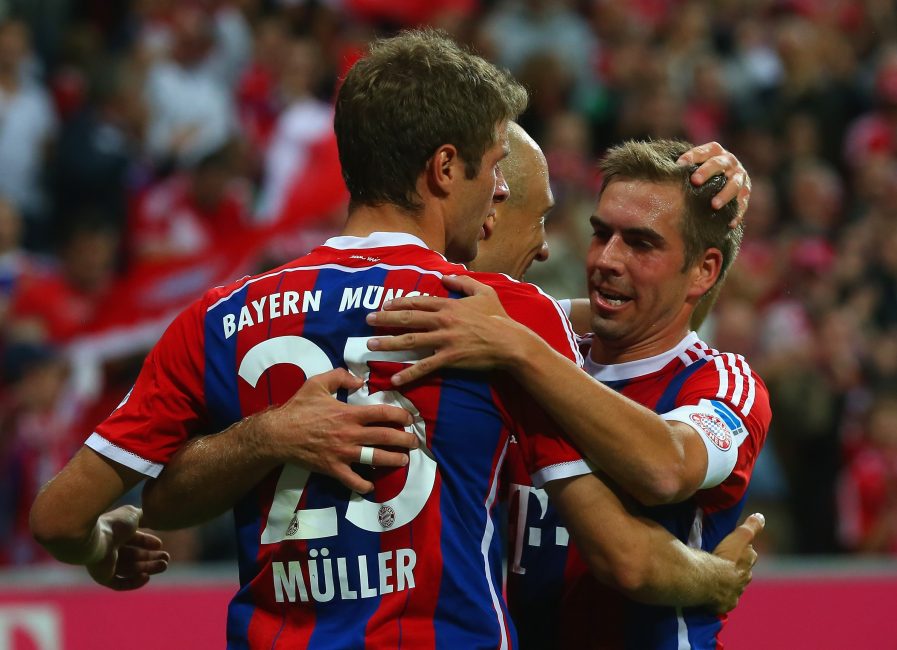
Miasanrot: How important were Philipp Lahm and Thomas Müller for your career?
Arjen Robben: Very important! With Philipp I had and with Thomas I still have a great relationship on the pitch. Off the pitch too. And with Philipp that’s obviously something very special. On the right he was always behind and especially in the later years that was a blind understanding. I knew where he was, what he wanted, and it was the case the other way around too. That was brilliant, it was a lot of fun for me and also a big honour. Philipp is a big name, not just at Bayern but for German football. Brilliant that I was able to play with him and the same goes for Thomas. When Thomas is on the pitch, I’m also always a few percentage points better.
Miasanrot: How thoroughly was the winger’s role planned out. Could you take liberties?
Arjen Robben: Yeah, but obviously not to the extent that you can go where you want. Obviously you do play on the touchline, but from time to time at the right moment you can come inside. You’ve got to have a good vibe there with the striker, the midfielders, so you don’t move into the same position.
Miasanrot: Have you ever had to adapt your game in your career because you noticed that your speed had declined?
Arjen Robben: No, but I think you develop as a player anyway. (pauses to think) I don’t know if it’s adapting when you improve in other areas of your game, but I think my strength still lies in my one-on-one abilities. But it doesn’t always have to just be about dribbling, it can also work with a nice pass or that I play someone in behind with a pass after cutting inside. Thomas is a great example here. He opens up space. Or the full back who then gets in behind and then sometimes it’s quite a simple pass or a bit more difficult. You can create something like that as well and you don’t always have to do it yourself. That’s definitely developed over the years, yeah.
“Guardiola is just the grand master at that”
Miasanrot: You mentioned combination play. Did you also get even better at that because of Pep Guardiola?
Arjen Robben: Yeah. Tactically he was just a brilliant coach and it was an unbelievable amount of fun to work with him.
Miasanrot: That being pushed…
Arjen Robben: …yeah, being pushed and how he thinks about football, what he demands from his players. But without meaning that – you’ve always got to be careful here – that others weren’t good. Not at all. But he’s exceptional at that, he’s really so good at that and as I said, you’re pushed in that respect. Under him I also played in different positions, not just wide right. I played at times up front as a nine, but also at times as a ten behind the striker or even as a midfielder. Once even as a right wing-back in a back-five.
Miasanrot: That being against Roma, in the 7-1…
Arjen Robben: …I started there, true. And against Shakhtar Donetsk, at home, Franck and I played as midfielders and others played further forwards. That’s fun and there too you develop further, getting into different positions, you have to think differently sometimes. That was nice and as I said, Guardiola is just the grand master at that.
Miasanrot: When you say that Guardiola stood for that tactical quality, what did Van Gaal and Jupp Heynckes then stand for?
Arjen Robben: That’s always difficult. Those are then always general answers, but everyone has their own style, their own way of dealing with players, of leading training, and both are obviously so experienced. They knew exactly what was required – also in international football. With both of them we worked very intensively at Bayern, always worked very well tactically and they also have similarities there for sure.
Miasanrot: Would you say that there was also a common thread between those coaches?
Arjen Robben: Yeah, I do think that quite a bit changed since Van Gaal came, and that’s remained. But you’re also always a bit reliant on the players that you have. At the end of the day as a coach you’re responsible, but the players have to do it on the pitch. You can want what you want, but you then need the players to carry that out. Over the years, this is now my tenth season, we’ve improved in that respect. Since I’ve been here, it’s actually gotten better and better.
Miasanrot: How does a trainer get authority with you, and what does it take for you to trust him?
Arjen Robben: I always appreciate it when a coach is open and honest and says how things are – even when that’s negative. And that in a one-on-one discussion you also know what he wants from you. That you know what you might be able to improve and that he tells you what you can look at. But honesty, openness and good communication are really the most important for good cooperation.
Miasanrot: This season, though, we have the feeling that in midfield the positions aren’t quite so well occupied, and that the ball goes wide quite early in the build-up. Do you have the feeling that the defenders are then onto you more quickly?
Arjen Robben: We’re going pretty deep into tactics here (laughs). In principle it’s the case that opponents always come here and play defensively. And we always have to try to have those surprise moments. We always have to make the ball move quickly – speed has to be there, we have to pass at the right moment. It’s a lot of things that come together and also the cohesion, how you’re positioned on the pitch, where, as you say, people get the ball. If you get the ball and you’ve got two or three players at your feet, then that’s not good. For the wingers it’s obviously pretty important, when it goes quickly, that you have a one-on-one. Then you’ve got a lot more chances and a lot more possibilities. But the exact same goes for the striker or the midfielder. They also have to get the ball in the precise moment, or run in behind, so that the ball comes at the right moment. Every position has something different and needs something different too, and here that cohesion and fluency, you could also say automatisms, are really important. And that’s where in the last period, after starting pretty well, we’ve had a few difficulties.
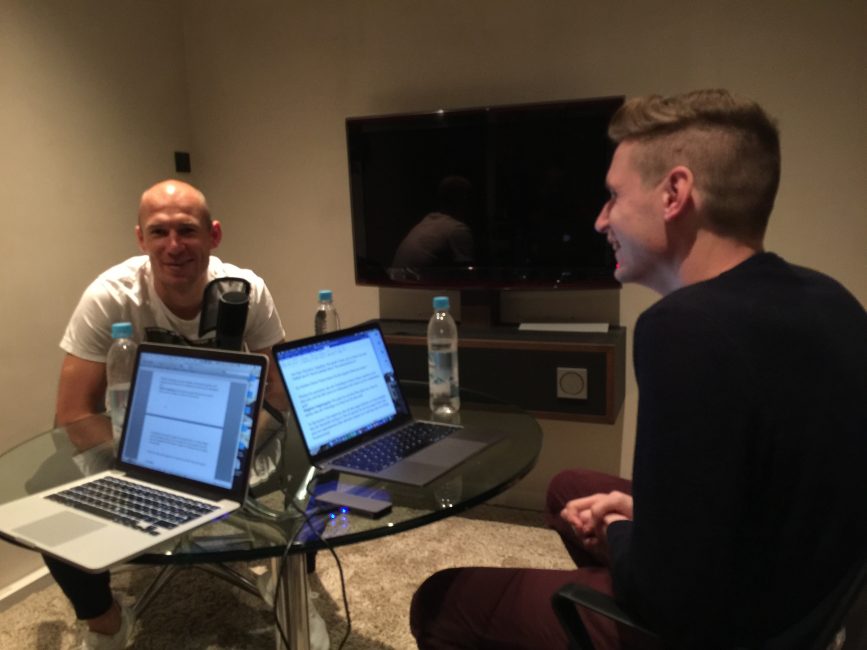
Miasanrot: When you notice in a game that it’s not working, are there then particular things that you do?
Arjen Robben: We obviously speak amongst ourselves. But that, I think, is quite complicated. You can’t answer that so simply. Sometimes it’s one of those phases and you need a moment where the knot snaps.
Miasanrot: Where something comes off again…
Arjen Robben: …yeah, exactly. Where you win five, six-nil or something. For the confidence, for the feeling. But I still find that we have so much quality in the team. The most important thing is that there has to be the joy in playing. In running too. We can obviously play football and obviously you can talk about such small things, but above all that’s what we need: fluency, rhythm, a lot of speed. And if something goes wrong, then something goes wrong and then we all together have to win the ball back as quickly as possible. But that’s not just something where we can then say that we’re back again if we do that better. A little bit here, a little bit there and at the end of the day success helps – sometimes a good victory. Not a one-nil, but a four or five-nil.
“Pressure makes me better”
Miasanrot: Per Mertesacker spoke recently very openly about coping with pressure in professional football. How is that with you?
Arjen Robben: I love it actually. Pressure makes me better. Pressure is a part of it. You also learn that over the years and obviously sometimes you’re nervous too, but that’s a part of it and it’s healthy tension. It’s not like I think: “Oh, now you’ve got to perform.” No, pressure makes me strong and when those big games come, then you’ve just got to be there. Then you have to say: “Okay, now I’ll show them all.” Then that’s what you do everything for in your career. You’ve worked for that and now you’re on the highest platform, let’s say, and then with those big games you can…
Miasanrot: …then you can reward yourself.
Arjen Robben: It’s a reward! And then it’s nice when you say (snaps his fingers): “Okay, bring it on. I’m ready.”
Miasanrot: And then a final like 2012 is obviously difficult too, where maybe you rebuke yourself as well. And then the 2013 final comes along. Where you not thinking about that? No “Please not again”?
Arjen Robben: No, with that one I was actually quite confident. That’s always easy to say now, but that’s just how it was. I can still remember it well. I was on the bus, listened to a bit of music, as usual, but in my head I was very clear and I knew perfectly well that we’d lost a final twice, but not today. Today’s our day. And that’s how I went into the game. And I did have one or two chances in the first half when the ball didn’t go in. I pulled myself together again in the dressing room and said to myself: “Okay, put it behind you. It happens. Your moment will come.” As I said, I can just say that now, but I’m also honest about that. That’s just how it was. And it worked. In football you always need a bit of luck too. Sometimes it goes like that, sometimes differently. But it had to be like that and that was also a reward. After that quite disappointing season in 2013 with three second-placed finishes you noticed from the start, from the very first training session: here’s a team on the pitch and they want revenge now, and we did that.
Miasanrot: That’s probably also that positive mentality and attitude that’s needed for that.
Arjen Robben: Yeah, sure, but also within the team. Not just individually, but as a whole team together, everyone working for one another, a good atmosphere in the team: that’s the most important thing. That’s the only way you can succeed. That’s always a cliché, but that’s how it is. I’ve experienced that with Bayern, I’ve experienced that with the national team, and when not everything fit together and where the atmosphere wasn’t so good, then the performance isn’t so good either.
“It wasn’t the proper Bayern fans”
Miasanrot: Let’s briefly remain with 2012 again. So there were those unspeakable whistles in the Allianz Arena and you certainly couldn’t have been blamed if you had left afterwards. What convinced you that the team would get revenge? Was it perhaps also a score to settle?
Arjen Robben: No, but I think in moments like those you have to stay really close to yourself. There were obviously a lot of factors. It wasn’t so clear-cut that you can say: “That was the Bayern fans.” That was a few Bayern fans. I also, and this did good, heard from a lot of fan-clubs who apologised, even though it wasn’t them. It wasn’t the genuine, proper Bayern fans.
Miasanrot: It was a minority.
Arjen Robben: Exactly, and on the other hand I think it wasn’t communicated very fortunately. There was the whole story with the shirt, half Holland half Bayern, and everyone expected that I’d play one half with each team. Then I only played for Holland. But that’s how it was all done with the contract, and we were preparing for Euro 2012. I couldn’t do anything about it myself. But obviously in the moment that you’re on the pitch, not knowing everything and hearing about it later, it’s very painful, being whistled at in your own stadium.
Miasanrot: You said just now as well that you were completely convinced that revenge would come off in 2013. What about this season? What convinces you that the team will turn difficult periods good again?
Arjen Robben: That’s obviously what I hope. First we have to show it, but I’m convinced because the quality is there. Sometimes football is a snapshot and sometimes it can turn so quickly (snaps his fingers) – from one moment to the next, everything can be positive again.
Miasanrot: You guys had a good start and then it suddenly went downhill.
Arjen Robben: Exactly. You win the first five, six games and then all of a sudden you lose or you draw and there’s a sequence where you don’t win anymore. But it can go the same way in the other direction again too. So that’s why I think we just need another victory, where we don’t just win, but win convincingly. With a performance as well where you say: Damn! That was really good! Because we’re all people and a win like that just gives you confidence and a good feeling.
Miasanrot: So it’s in fact not the way one thinks, they’re so experienced, they’ve got to manage it themselves, right?
Arjen Robben: That’s not only the case in the football business, but everywhere. In a company there are also periods where things aren’t going right. So many things play a role in that. I also didn’t feel well physically in the last few weeks. I’ll never use that as an excuse, but we’re not robots. You just can’t accept it. Then every individual has to question themselves: Am I doing everything right? Where can I make things better? Then as well there’s the coaching staff, who tell us where we can do things a bit better.
Miasanrot: And when things are going better again, the Südkurve will sing the Arjen song. Have you ever sung that yourself anywhere?
Arjen Robben: Hmm… I have no idea right now. Obviously that also makes me proud, that I’ve got a song like that from our own fans, and that was a special, wonderful moment for everyone. Not just for me, but for the fans, the club, with the treble-season and the winning goal in the last minute, that’ll last for ever. Every little boy who is playing now dreams of something like that. When that happens, it’s obviously insane!
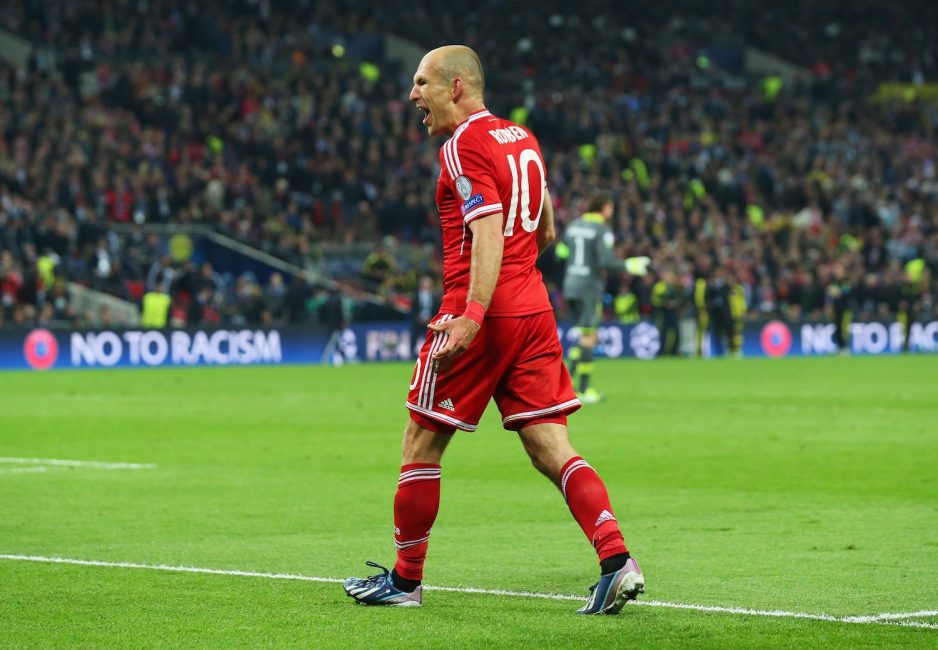
Miasanrot: Who has the best player you’ve ever played with? Other than Philipp Lahm of course, because that would be the obvious answer.
Arjen Robben: I can’t say that (laughs). But for me it’s a huge privilege that I’ve been able to play with so many good players. Also in the national team, when I started out in 2004 I played with – and for me these were still the big boys – players like Seedorf, Davids, Kluivert, De Boer, Van Nistelrooy. And then after it continued with my own generation. Guys like Wesley Sneijder or also at Madrid, at Chelsea – I can put three, four teams together and they’re all quality, I think.
“Then you sign autographs for an hour, instead of looking at the sea-lions”
Miasanrot: So you always say that you’d like to block out all the hype around you. How do you manage that and is it even possible?
Arjen Robben: I can manage it, but for others it’s more difficult. Wherever you are, people want something from you – photos, autographs, you’re obviously reminded of it then. But when I come home, I’m a father and a completely normal man. I do my own thing there too. Pop-stars for me are singers, and us footballers play football, that’s sport. But I’m aware that football is sport number one in Europe. That’s a part of it. I try to cope with that normally and when people want something then I try to do something. That’s not always possible though. When you have a day out with your family and there are a lot of people there, then sometimes I say it’s not possible. Then if you start with one, then you’re signing autographs for an hour, instead of looking at the sea-lions with my kids at the zoo. Usually people accept that too. But there are always a few who say, he’s arrogant. Yeah, then I feel bad as well.
Miasanrot: What have you missed out on as a result of your professional career?
Arjen Robben: I think you’ve missed out on something for sure, but you then have to catch up on that. Focus is on football and you live like a professional. How you live, how you eat, how you sleep. You miss out on things as a result too. Mostly I’ve missed out on individual moments with my family and my children. And that’s, I don’t want to say painful, but obviously that then plays a role at the end of my career when it’s about when I call it quits. And I’ve already missed out on a lot. Children do grow up so fast.
Miasanrot: So now there was that Super League concept. On a purely sporting level, would it get the competitor Arjen Robben going, playing against the world’s top teams every week, or could that get old at some point?
Arjen Robben: I don’t know, to be honest. I read that somewhere, but I’ve never really put serious thought into it. Maybe as well because it’s not yet on the way or not yet certain whether it will even happen. On the one hand you can obviously say that in a league like that there are always games at the highest level. On the other hand the Bundesliga, the English league, the Spanish league, also have their charms and it should stay that way. That’s why the Champions League is something so special. But I’m just saying that really spontaneously, I’ve never really thought about it seriously.
Miasanrot: Thank you, Arjen!
Arjen Robben: Don’t mention it!
Christian Nandelstädt and Justin Kraft carried out the interview on Tuesday the 20th of November 2018.
Translator’s note – original: ”hat uns direct das “Du” angeboten” – in German, there are two forms of the singular ‘you’, one formal (Sie) and one informal (du). In English, the closest equivalent is the difference between being on first-name terms and using ”Mr …”/”sir”. Here, Robben asked to use “du” instead of “Sie”, making for a more relaxed atmosphere.



